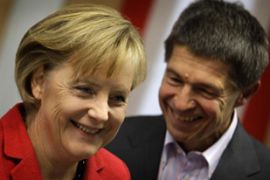Merkel seeks swift coalition talks
Victorious chancellor rejects spending cuts and says tax reductions possible in 2011.

Cuts pledge
The CDU and FPD will need to hammer out agreements on a range of issues, including labour market policy, the role of nuclear energy and how to tackle the country’s economic problems.
| in depth | |||||||||||
|
Germany’s export-dependent economy returned to slight growth in the second quarter, but is still expected to shrink by five per cent or more for the whole of this year.
Sunday’s election outcome has nudged the country to the right, but with the cautious, consensual Merkel still in charge, it did not appear likely to produce a radical lurch in economic policy.
The chancellor, who was meeting Guido Westerwelle, the FPD leader, later in the day, said she did not want to implement painful spending cuts to balance the books.
“So long as we are in this trough … the question of savings measures is not right,” Merkel said.
Melinda Crane, a journalist for Deutsche Welle television in Germany, told Al Jazeera the new government would “not have a lot of leeway” to implement major changes.
“We’re going to see the German economy take a nose-dive in the coming months. Germany’s economy is expected to see much higher unemployment next year and they have enormous … budget debts.
“They’re very, very tough challenges ahead.”
Tax cuts
A main plank of Merkel’s election campaign was a pledge to offer moderate middle-income tax relief.
The FPD wants a more radical overhaul of the tax system, cutting both the top and bottom income tax rates considerably.
Westerwelle told reporters on Monday his party would push for a “fair” tax system.
Merkel said possible tax cuts could be implemented starting in 2011 or 2012, but gave no details of what they might look like.
She has argued that cuts would stimulate economic growth and ultimately improve tax revenues.
The SPD had argued that it was a bad idea to cut taxes at a time when the government has run up substantial debts to combat the economic crisis.
Spaking to Al Jazeera, Thomas Kielinger, a correspondent for the German daily newspaper Die Welt, said: “Political life will now become far more interesting in the next four years than it has been in the last four.
“We’ll have a proper opposition now … and we’ll have a bit of a tug-of-war inside the coalition.
“The Free Democrats – more pro-market than Mrs Merkel’s party – will want to pull her more into capitalist, pro-business stance which will give her pause and might make her unpopular with large sections of German society.”
‘Bitter defeat’
The CDU and its Bavaria-only sister, the Christian Social Union, won 33.8 per cent of the vote, while the Social Democrats took 23 per cent in the election.
The Free Democrats captured 14.6 per cent, with the Left Party taking 11.9 per cent and the Greens 10.7 per cent.
That gave the conservatives 239 seats and the Free Democrats 93 in the lower house, for a comfortable centre-right majority of 332 seats to 290.
The Social Democrats won 146, the Left Party 76 and the Greens 68.
It was the SPD’s worst parliamentary election result since the second world and a significant shift from the 2005 election, in which Merkel’s conservatives just edged past their rivals.
Frank-Walter Steinmeier, the SPD’s leader, said the result was “a bitter defeat” but vowed to lead a strong opposition.
Voter turnout on Sunday was a post-war low of 70.8 per cent, down from 77.7 per cent four years ago.
The vote took place against a backdrop of heightened security after al-Qaeda issued several videos last week threatening to punish Germany if voters backed a government that kept German troops in Afghanistan.
